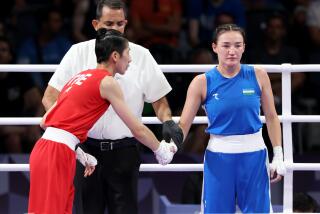These Days, He Uses Kid Gloves : Pimentel, Who Punished Foes in Brilliant Ring Career, Falls Back on Grandfather Clause
NORTH HILLS â These are the hands that once formed the fists of one of the most-punishing punchers in professional boxing.
They are strong hands, with worn, stained and bent fingers.
These are the hands of Jesus Pimentel, perhaps the greatest bantamweight fighter who never won a world championship.
Now they are a grandfatherâs hands, gently and lovingly stroking the arms and legs of grandson Andrew Christian as the stocky 4-month-old snuggles into a portable bassinet for an afternoon nap.
Pimentel is sitting on the edge of a couch inside the den of his North Hills home, where he has lived for 15 years. The noise from the busy thoroughfare out front is drowned out by the baseball announcers on the television.
For the next two hours, the TV stays on the same station. The ballgame ends, the postgame report is a wrap, Bugs Bunny cartoons take over the screen. Pimentel pays no attention.
He is recounting his life and career for a visitor, his voice resonating with passion, bitterness, joy.
Pimentel boxed 88 times, winning 81, including 72 by knockout. During his prime, he stopped 29 fighters in a row--still a record for bantamweights. He fought for a world title once, against Ruben Olivares at the
Forum on Dec. 14, 1971.
By most accounts, including his own, Pimentel by then was well past his prime.
He lost.
Then he quit, with few regrets.
âI didnât do what a lot of fighters do, keep fighting even when itâs time to retire,â Pimentel says. âThank God. I feel good, physically and mentally, and I still keep myself in good condition.â
Pimentel is 55 years old. He says he is about eight pounds over fighting weight, which used to be about 117 1/2 packed over a 5-foot-4 frame. He speaks steadily, thoughtfully and with unfailing memory.
The front room of Pimentelâs home is a shrine to his boxing career. Framed photographs and a large painted portrait of him almost entirely cover the walls. A glass cabinet is filled with mementos, including a four-foot high trophy from the former editor of Ring magazine hailing him as â. . . the greatest knockout puncher in bantamweight history.â
Pimentel was born in Sayula, Mexico, a small town located about 50 miles south of Guadalajara in the state of Jalisco.
In 1950, when Jesus was 10, his family immigrated to the United States by sneaking over the border at a railroad crossing, then eluding immigration officers at a checkpoint by silently hiding under a canvas in the back of an uncleâs pickup truck.
The family settled first in the San Gabriel Valley, then in East Los Angeles. Pimentel learned English at Brooklyn Elementary School, located just up the street from the Brooklyn Gym, a famous cradle of boxers.
Each year after school let out, Pimentelâs father packed up his family and moved them to Northern California, where they toiled as farm workers for the rest of the summer.
Pimentel was enrolled at Garfield High when U.S. immigration officials finally caught up to the family and had them deported.
After moving first to Tijuana and then to Mexicali, Pimentel spent most of 1958 picking cotton before deciding that he wanted something better for himself.
A job hunt landed him a position pumping gas and washing buses in Pueblo Nuevo, a barrio in Mexicali. His boss was a local boxing promoter. Most of his co-workers were boxing prospects.
Pimentel first entered the ring unwittingly, after following a friend to a local bullring for a Golden Gloves competition. When the friendâs opponent didnât show up, Pimentel was prodded into serving as a replacement. He was given shoes, socks, hand wraps, a mouthpiece and white trunks.
The trunks soon were red, soaked in blood. âI was bleeding, how did we say? Like a stuffed pig,â Pimentel says.
The fight was stopped in the second round and Pimentel had no designs on a rematch. Boxing, he was convinced, was not for him.
He went back to the gas station, but his friends persisted in coaxing him back to the gym.
In June, 1959, Pimentel decided to dedicate himself to boxing. By the end of that year, he had been entered in three amateur tournaments, finishing second in the first two and winning a Mexicali city championship in the last.
Pimentel did not have an overly impressive amateur career.
âI tell people I had 21 amateur fights and lost 23,â he says. âThey get a kick out of it--my way of saying I didnât have too good of a record.â
While still pumping gas in Mexicali, Pimentel was introduced to Harry Kabakoff, an American boxing manager known for scouring the barrios of Mexico in search of young talent.
One of Kabakoffâs nicknames was the âGhetto Ghost.â
For Pimentel, he was a savior.
Kabakoff made arrangements for Pimentel to secure a border crossing card, and each day the young fighter traveled to his managerâs home in Calexico to train.
Pimentel had his first five professional fights in Mexico, then stopped Willie Kee in Stockton in his U.S. boxing debut.
Fighter and manager soon became inseparable.
Don Chargin, who promoted some of Pimentelâs bouts at the Olympic Auditorium and in Northern California, recalls Kabakoff inventing ways to care for his fighter even when money was tight.
âWhen they were living up in Sacramento and it was 110 degrees out, Kabakoff would go to the [market] wearing a big, heavy jacket and steal hot dogs for himself and steaks for Pimentel,â Chargin said.
They were a dynamic duo--figuratively and, once, literally. To drum up publicity for a fight at the Olympic, promoter Don Fraser had manager and fighter dress up in Batman and Robin costumes.
âWe had to get Kabakoff an extra-large Batman outfit,â Fraser recalled. âHe was about 300 pounds.â
Kabakoff, whose given name was Melville Himmelfarb, smoked cigars, ate junk food and shamelessly hyped the skills of his protege.
Pimentel, dwarfed by his pot-bellied manager, carefully watched his diet and trained tirelessly.
âMy girlfriend, who is now my wife, used to say, âJesus, you take care of yourself like a senoritaâ--you know, like a virgin,â Pimentel says. âI told her I had to. That was the only wayI was going to be successful.â
Pimentel surged into prominence in Los Angeles by defeating Jose Portillo Lopez at the Olympic early in 1963.
The knock on Pimentel to that point was that his opponents were weak. During the introductions, Pimentel was roundly booed and Lopez, an undefeated local favorite, was cheered.
Pimentel stopped Lopez in the eighth round, but only after what became a well-publicized exchange between Kabakoff and his fighter in the middle of the bout.
Frustrated by Pimentelâs unusual reserve, Kabakoff slapped his fighter in the face between one of the rounds, and exhorting him: âStop fighting like a private! Start using your jab and start fighting like a general!â
In 1964, Pimentel was set for his first world title shot, a bout in San Antonio against champion Eder Jofre of Brazil when the fight was canceled because of a contract dispute.
In 1965, Pimentel was on the verge of another try at the title when he lost a split decision to champion Jose Medel of Mexico. Pimentel was comfortably ahead in the fight until the 11th round when, during an exchange on the ropes, Medel caught him square on the chin with a straight right.
âWhen I got up, I could see nothing but blurriness,â Pimentel recalls. âI remember picturing Medel like a bull in the ring, smoke coming out of his nose and kicking dirt, ready to charge.â
Instead of staying away and buying time to recuperate, Pimentel engaged his opponent and was dropped again, this time by a right cross just before the end of the round.
Pimentel rallied in the final round, but the two late knockdowns were enough to earn Medel the victory.
Reportedly, Kabakoff later turned down an opportunity for Pimentel to fight for the title against Masahiko Harada in Japan.
Lionel Rose took the bout instead, and won the bantamweight crown with an upset.
âKabakoff never lived that down,â Fraser said.
Although past his prime by the time he fought Olivares, Pimentel lasted 12 rounds before Kabakoff finally threw in the towel.
âA lot of people wondered why they stopped the fight, but I knew,â Pimentel says. âPunches I could easily take away when I was younger were catching up to me. That was the first time I felt like I was really getting hurt.â
Pimentel became a car salesman. Then a boxing promoter. Then a car salesman again.
Now he owns his own landscaping and gardening business. âI just couldnât make it as a car salesman,â he says. âI was too honest.â
He got a good deal on the home were his family lives, in part, he says, because the previous owner was a fight fan.
Pimentel watches boxing on television but, for the most part, he doesnât like what he sees.
âFighters today, all I hear is a lot of bow, wow, wow,â Pimentel says. âThey talk like wrestlers. âMuhammad Ali used to talk, but he used to back it up.â
He yearns for another Sugar Ray Robinson. Or even a workaholic like Jesus Pimentel.
He likes Oscar De La Hoya, the World Boxing Assn. lightweight champion from East Los Angeles. But to Pimentel, De La Hoya, with only 18 professional fights, is still âa prospect.â
As for his own place in boxing history, time has helped Pimentel to the threshold of being content.
âMy youngest son, he asks me, âDad, if you were born again, would you be a boxer?â â Pimentel says.
âI say, âYes, I would.â I really enjoyed what I did. I feel pride in what I did in boxing.â
More to Read
Go beyond the scoreboard
Get the latest on L.A.'s teams in the daily Sports Report newsletter.
You may occasionally receive promotional content from the Los Angeles Times.











